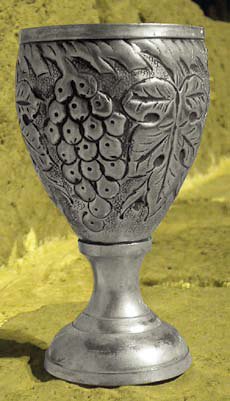
The interpretation of Chapter 31, verses 21, 22, 23, 24 in the Book of Numbers is the basis for the use of a ‘mikveh for vessels’. On referring to the Encyclopaedia Judaica I learned that its use is a custom only and not a law. It was originally intended to apply only to new vessels manufactured by non-Jews. I would like to discuss this aspect below.
I was born in East London within an orthodox community well before the Second World War. I can recall no-one mentioning or using such a mikveh, although I do recall knowing of one. It was housed in a little ‘shteibel’, the Zjickevah shteibel, situated in a tiny turning called Dunk Street. I doubt whether many people would have known of it. At that time tens of thousands of Jews lived in the area that needed many dozens of kosher butchers and poulterers to serve them. If it was essential to use a mikveh for vessels, then comparing its need to the community’s need for butchers and poulterers, surely there would have been more than just the one such mikveh known to me. I wonder how many people reading this essay, those who come from orthodox or traditional families, recall their parents using such a mikveh or even recalling whether there was one available? Local orthodox synagogues in the UK with which I was associated often bought cutlery and crockery for self-use but taking them to a mikveh before using them was never suggested.
Is it worth dividing the community even further, as is now constantly happening, just for the sake of only a custom? When someone attends a private, supervised kosher simcha, in the home of a member of his family, but refuses to eat fruit just because it was prepared using a brand new knife that had not been dipped in a mikveh, I see it as yet another element dividing the community and family. Sometimes it is an act causing dishonor and disrespect to parents.
This is not the only example of teachings that may cause dishonor and disrespect to parents. There are instances where boys from unquestionably kosher homes go to yeshiva and are told by their rabbis that they must eat only glatt kosher meat when visiting home. Never mind that the meat provided by the parents often comes from the same kosher butcher as that patronized by the local rabbi. Such instructions can create, albeit perhaps inadvertently, disrespect or dishonor to parents, whether some parents wish to admit it or not. How can rabbis, if not the young student, not realize that the parents might be offended that their standard of kashrut is being questioned and their status undermined by someone who does not know them. Not to mention that ‘glatt’ meat is usually much more expensive.
Another example of possible disrespect or dishonoring of parents concerns young newlywed ladies who are often taught to cover their heads in public. They are taught that it is immodest not to do so. They often sit at a table together with their religious mother and religious grandmother who do not cover their hair. A logical assumption might be that their mothers and grandmothers are immodest. I have many orthodox rabbis among my friends and acquaintances whose wives do not usually cover their heads, so the importance of doing so is greatly overstated.
These questionable interpretations are straining the pleasures of family unity. Sometimes they are put even before the very special mitzvah of honoring one’s parents. I find it incredible that whilst, in the past, commentators of the Torah strongly emphasized the imperative of ‘honoring one’s parents’; and they taught how to do so in great detail, often causing difficulties and great inconvenience to the child, some religious teachers today are turning their teachings upside-down.
Let people ‘dip’ their new vessels. Let people eat glatt meat. Let ladies cover their hair. Everyone is entitled to do as he/she wishes but these acts are customs only, not law, so why not for the sake of unity, keep them for personal use only and not let them impose upon other people’s valid customs and behavior. Such practices within the community decreased dramatically over a period of time. Why reintroduce them now into a completely different environment in which they can be, and often are, divisive? Their practitioners should recognize that what they are doing is not fundamental to our religion but further steps in dividing an already divided community.
There is another area of Jewish life where the rabbis now rule that we may not use a product if it is touched by non-Jews and this area is in the use of wine. I think that this ruling has become confused in transmission. Originally, the ruling was that we may not use wine made by pagans for they may have used the wine for libations to their pagan gods. Today’s ruling is of the ‘becoming ever more strict’ kind mentioned above. Almost eight hundred years ago Maimonides ruled that Muslims and Christians were not pagans and following his ruling, why should their wine not be used? Which firms today would offer libations to pagan gods? Indeed, it is a fact that not all that long ago wine made by non-Jewish firms graced the table of most supervised kosher functions in the U.K., possibly as a result of the more lenient ruling. Is this stricter ruling not an insult to non-pagans; to the Christians and the Muslims that Maimonides wrote about?
The rabbis themselves have divided wine made by non-Jews into two categories; 'Yayin Netzach' and 'Stum Yayin'. We are supposed to be stricter about the use of the first category than the second. So how do they advise us to distinguish between them? I don’t think that they do. We are forbidden to drink either. So why distinguish? But how can the thinking about pagans and libations be applied to metal vessels?
 AMIT DRESSLER - HELPING THE LESS FORTUNATE
AMIT DRESSLER - HELPING THE LESS FORTUNATE ESRA VOLUNTEER AWARD WINNERS 2010
ESRA VOLUNTEER AWARD WINNERS 2010 FACT OVERWHELMS FICTION
FACT OVERWHELMS FICTION-1516356428.jpg) Hand in Hand Food Pantry
Hand in Hand Food Pantry Forever Slim
Forever Slim Food Foolish
Food Foolish